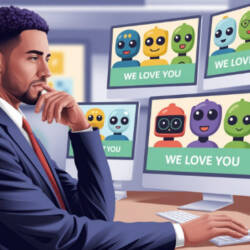Through the Looking Glass: How a Transparent Society Might Help Reduce Sexual Shame
“Nothing makes us so lonely as our secrets” –Paul Tournier

Between our need to feel protected and not wanting to be observed without permission, privacy as a social concern, or perhaps as a fundamental right, is skyrocketing.
What isn’t as frequently discussed is the—admittedly unusual—idea of everyone having the ability to watch everyone else, which could make us emotionally healthier, more open towards our own and other people’s sexuality, and overall much happier.
Living in clear houses
Initially postulated in David Brin’s non-fiction book of the same name, a Transparent Society is one where corporations and governments may keep an eye on us, but we, their citizens and consumers, can do the same to them: a system of surveillance checks and balances designed to keep us safe while preventing our privacy abuses.
Dubbed “sousveillance” by futurist inventor Steve Mann, it’s essentially about the observed having the same rights and access to monitoring technologies as the observer.
Though media depictions of transparent societies aren’t common—and when they are prevalent, a percentage aren’t positive—there have been a couple of notable exceptions.
While differing dramatically from Dave Eggers‘s novel from which it’s based, the James Ponsoldt-directed film The Circle features a decidedly malevolent corporation whose motto, “privacy is theft,” reveals its plans to gain access to and from there exploit, the entirety of their users’ personal data.
At the end, this plan is thwarted by the main protagonist, played by Emma Watson, who turns the tables by exposing the corporate head’s own secrets.
What’s unusual about the movie is its ending, which, rather than implying we should have a right to keep our secrets to ourselves, appears to advocate for the opposite.
In other words, a world where bliss isn’t found in ignorance but instead apparently lies in knowing, thus accepting, everything about everyone by choosing to open our lives to public scrutiny. It’s a world where piracy isn’t theft, but sharing and openness is an act of giving.
You’re not the only one
We’ve all felt it at one time or another or, if you are particularly unfortunate, a dominating, nearly inescapable awareness that you’re a freak, a weirdo.
For when you look out at the world, your desires and your sexual needs aren’t represented, or when they are, they—and people like you—are mocked and humiliated.
But what if you knew, without a doubt, you aren’t and have never been the only person like that? Growing up in a society without privacy, where anytime you wanted, you could see there are a thousand, a million people with your passions in common would mean no more painful secrets, suffering in silence, or experiencing shame or guilt.
RECOMMENDED READ: Seeing Is Believing: Will AR Plus a Social Credit System Lead to a Sexual Utopia?
Hypocrites, who used to ruin people’s lives for the same things they also did behind closed doors, would be exposed—and previously invisible or endlessly denied sexual crimes revealed. For that matter, a fully transparent society could make lies or deceit obsolete: “I’d like to call the following thousand witnesses to the stand.”
Loneliness? Say, “I want to be spanked,” and an equally large number of ready, willing, and excited playmates would knock at your (virtual) door.
But will they be safe to play with? Naturally, you—and your millions of friends—will have thoroughly vetted them beforehand.
A privacy-less world could also help reshape social mores for the better: why even consider acting inappropriately when everyone’s watching you and everybody else? Honesty and understanding could eventually become second nature, as innate to humanity as breathing or as invisibly automatic as our beating hearts.
No need to throw stones
A transparent society is certainly an intriguing concept. If anything, it directly challenges many of our long-held beliefs, like the sanctity of privacy and our fears of being observed—and judged.
However, don’t forget that the most outrageous concepts and important discussions surrounding them can also lead to groundbreakingly original solutions to otherwise impossible-seeming problems.
Who knows? Maybe I’m not the only person who feels the emotional, sexual, and social possibilities an open society might offer are worth considering—that a degree of awkwardness and social discomfort is a small price to pay for a world where shame, guilt, or loneliness are outdated concepts?
Proving my point, in a transparent society, I wouldn’t feel crazy or wrong, guilty or ashamed because I’d know and be comforted by the fact that I’m not—never, ever—for thinking this way.
Image Sources: Depositphotos

















